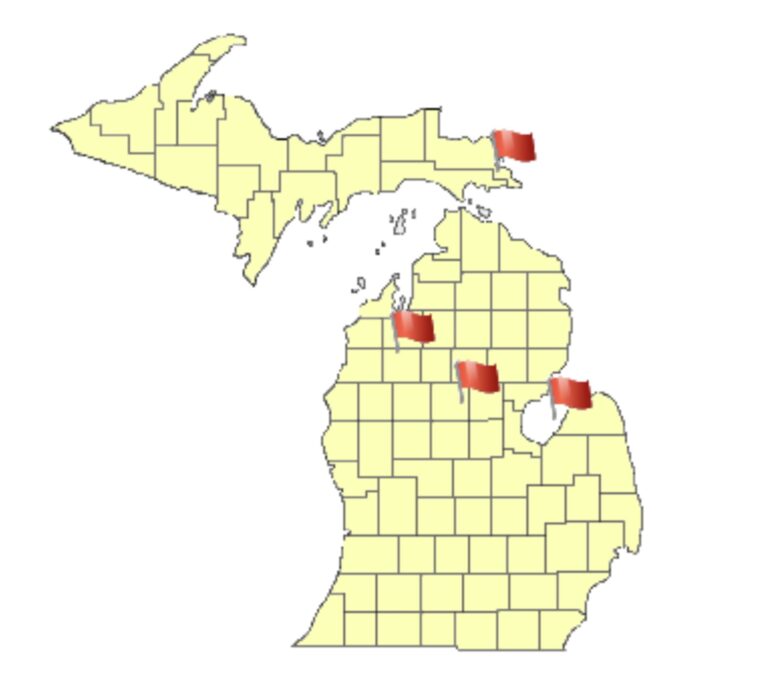
Department of Environment, Great Lakes and Energy.
There are currently four E. Coli-related beach closures in Arenac, Roscommon, Grand Traverse and Chippewa counties.By KELSEY LESTER
Capital News Service
LANSING – As lakes and rivers cool with the arrival of fall, avid swimmers may be at risk for illnesses due to contact with contaminated water.
That’s because of a health threat from Escherichia coli – familiarly known as E. coli. It’s a bacteria from raw meat or fecal matter, which in the case of Michigan rivers and lakes usually is caused by waste from animals like geese.
The state has had numerous outbreaks this year, according to the Department of Environment, Great Lakes and Energy beach guard system. And as many as half of the state’s rivers and streams are contaminated with E. coli, one expert said.
In July, over 12 beaches were closed at the same time due to outbreaks, including ones in Oakland, Macomb, Arenac, Roscommon and Cheboygan counties, according to press reports.
Megan Tinsley, the water policy director for the Michigan Environmental Council, says the state needs to do better.
“To me it’s absolutely shocking, considering we bill ourselves as Pure Michigan and we are advertising across the nation to come here for the clean water, for fishing and all those sorts of things,” Tinsley said.
While there are only four beach closures now, Michigan has had over 140 closures in 2023 from elevated E. coli levels and has issued many more health advisories, according to the department’s beach guard system.
One current closure is at Singing Bridge Beach on Lake Huron in Arenac County. The beach has been closed for over 73 days and is still testing high levels of E. coli.
After testing a drain outlet on Aug. 7, the beach was set at a level four risk — the most severe level, which is considered gross contamination and a health risk, according to the beach guard website.
The director of environmental health for the Central Michigan District Health Department, Steve King, says that is because of contaminated rivers from rural areas connecting with Lake Huron.
“We’ll go out and sample the beaches and run our normal testing. We’ll create what we call filters — filtering water and then sending those out where the DNA is analyzed,” King said.
“Saginaw Valley State University can tell us if DNA is either human-sourced or comes from cattle, pigs or deer,” King said. “If we identify geese, we’ve worked with beach managers and control measures (recommended by the departments of Natural Resource and Environment, Great Lakes and Energy) to make the beach less attractive to geese.”
Lakeview Waterfront Park on Houghton Lake in Roscommon County has been closed for over 64 days after test results from July 7 appeared to be three times over the state’s standard for E. coli. Four days later, the condition worsened to over 10 times the standard and is still at high levels.
Roscommon Township Supervisor Diane Randall blames geese.
“We have a huge amount of geese there. The park is all natural — there’s no seawall or anything — and the first phase of that park even put a fishing dock out because it’s really wonderful for wildlife like the geese and the fish,” she said.
“But the bad part of that is geese aren’t really potty trained,” Randall said.
Michigan’s E. coli standard for safe swimming is substantially higher than that of some other states, like New Hampshire and New York.
“We have such a big tourism-based economy in Michigan, and that’s also a point I try to highlight frequently,” said Tinsley, of the Environmental Council.
“I think it’s predicted that half of Michigan’s rivers and streams are out of compliance for what would be a level of E. coli in the waters that’s safe for either body contact, or swimming.”
An August outbreak occurred at Traverse City’s Haserot Beach, East Bay Park and Sunset Park, but the swimming ban was lifted after the Grand Traverse County Health Department announced they had met the state standards for safe swimming.
However, East Bay Park was closed again after an advisory about contamination from an unknown pollution source. The park has been closed for only one to two days at a time since 2011, mostly due to storm water runoff.
There is also a contamination advisory in effect at Four Mile Beach in Chippewa County due to sanitary sewer overflow and storm water runoff.
King encouraged those who are looking to get some last-minute swimming in, to check the beach guard website beforehand.
“People can see for themselves whether or not the most recent testing is a relatively safe environment, if you’re going out to their beach or if there’s some concerns about what those E. coli levels might be,” he said. “I think that’s really great that the state helps out local health departments to do that.”